Platforms:
Xbox One, PS4, PC
Released:
December 1, 2020
Publisher:
Bandai Namco Entertainment
Developer:
Dontnod Entertainment
In my preview for Twin Mirror, I essentially did my best to walk the line of the format. You’re supposed to talk about your experience, but generally, be light and hopeful about the full release. I took this mentality through to my full playthrough of Twin Mirror too. Even as I joked about the protagonist and the predictable story, I was silently hoping for things to turn the corner. Have you ever heard of a black hole’s event horizon? It’s the colloquial point of no return. I think it’s fair to say that a video game’s event horizon occurs right at the end of the experience. You can’t hope for the game to get better when you’re watching end credits roll. In truth, while a subsequent playthrough was more positive, I still feel my hope was somewhat misplaced.
Twin Mirror starts off with some advantages, being developed by the well-established team at DONTNOD. They are best known for their work on the Life is Strange franchise. Although Twin Mirror isn’t even the only title dropped by the studio this year, with Tell Me Why releasing back in August. In our review, we viewed Tell Me Why as not only a great game but a massive step forward for trans representation. Twin Mirror also brings about the return of the standalone game, a format DONTNOD has dabbled in but aren’t most well known for. Perhaps this was a bad omen for Twin Mirror? After all, their prior standalone titles never really managed to have that much of an impact on the gaming landscape. I’ve played Remember Me and it’s, amusingly enough, rather forgettable. If critical consensus is anything to go on, Vampyr fares about the same.
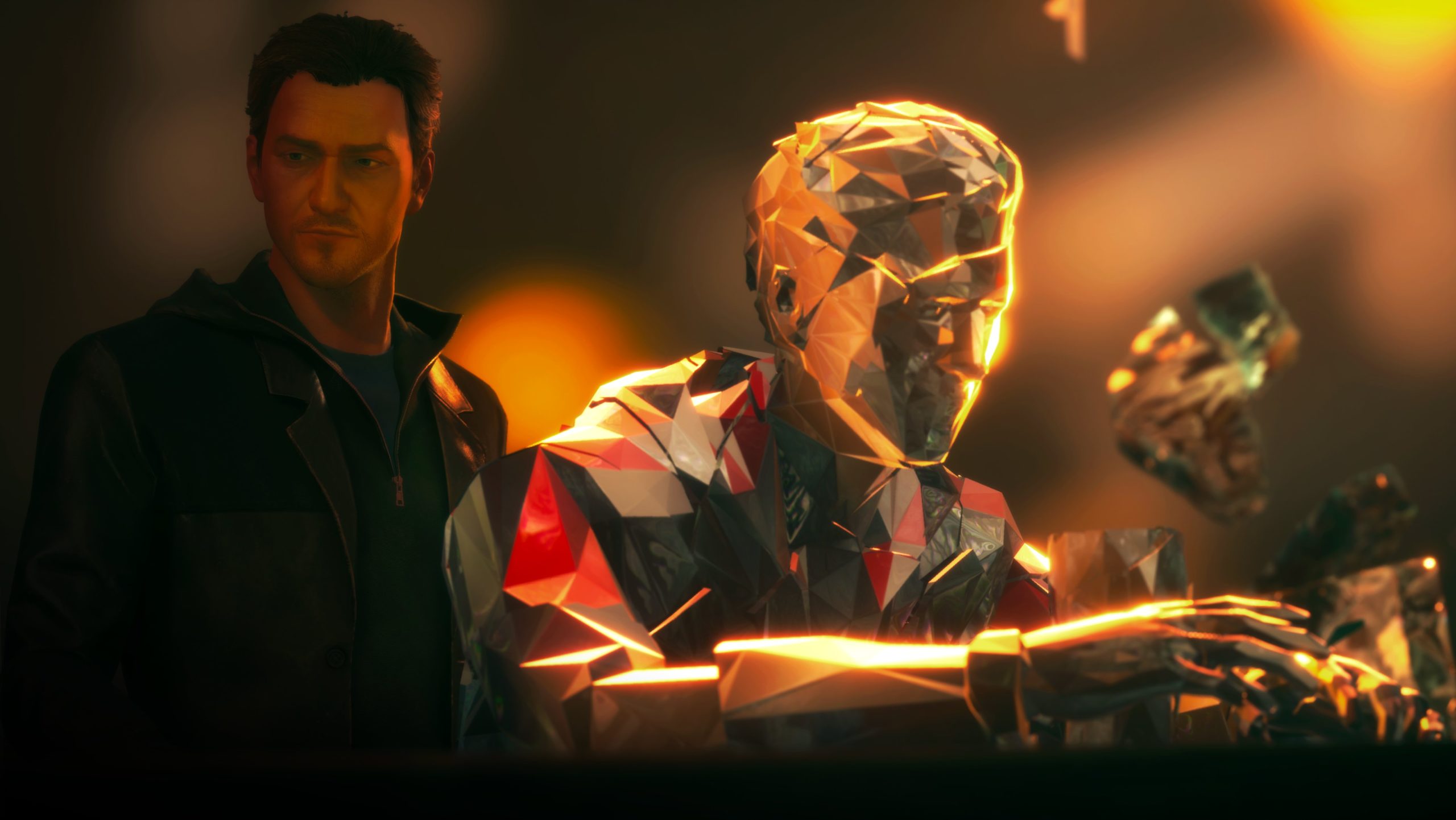
Despite releasing as a standalone project and not an episodic project, Twin Mirror feels like it has taken a lot of elements from DONTNOD’s more successful titles. It’s clear that the studio knows what its strengths are, but the small missteps of the game overall compound quite a bit.
The story is pretty basic. Sam is a journalist who is one of those staunch “truth is more important than people” kind of guys. It’s established that Sam is returning to his hometown of Basswood under a cloud of personal issues. Two years ago, an article he wrote led to the shutdown of a local mine. It likely saved many from crippling workplace accidents, but definitely put a large wedge of the population out of employment. As such, this large sector sees him as some life-ruining menace, and he sees himself as a broody victim of circumstance. There’s a really obvious Sherlock undercurrent to all this, hell there’s even a ‘Mind Palace’ in play.
Sam returns due to the passing of a close friend. He then finds himself embroiled in old relationships and, in due time, a mystery. The good news is he has his Mind Palace to try and piece stuff together and a doppelganger that is trying to push him to be more social.
The story, unfortunately, ends up being pretty boring and predictable, so let’s table that discussion for now. Rather, I’d like to explore the magical realism on offer in the form of the Mind Palace and the Double. These mechanics serve as unique selling points. And after completing the game and reflecting back, they not only build Sam’s character but also inform the gameplay.
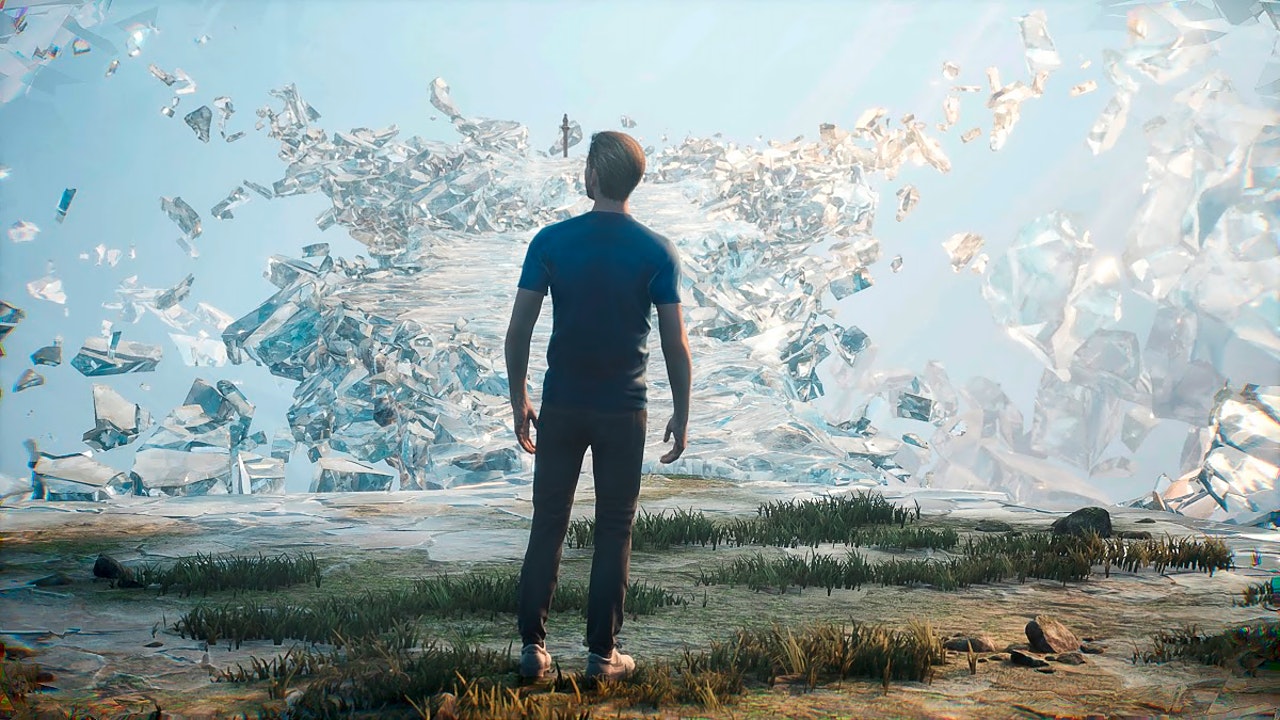
The Mirror: The Mystery and the Mind Palace
The first element is the Mind Palace, a mirror world in many senses of the phrase. It’s a place to reflect on the past, it’s a place that is a simulacrum of whatever scene is being puzzled through, and the whole glassy aesthetic comes into play. In practice, its a surreal location that Sam visits to solve mysteries or form detailed plans.
Sam’s been involved in a bar fight. He visits his Mind Palace to piece together exactly what happened. Step one: collect clues, get some physical evidence that may indicate how the fight took place, and hopefully discover who it was with. Once collated, the evidence helps to inform the truth. Where did the fight start? Where did it go? Where did it end up? And finally, who is implicated in the fight? Each of these is resolved to two or three multiple choices. In the end, you can see how the simulated fight plays out, and if incorrect, you can alter the variables and see if it lines up.
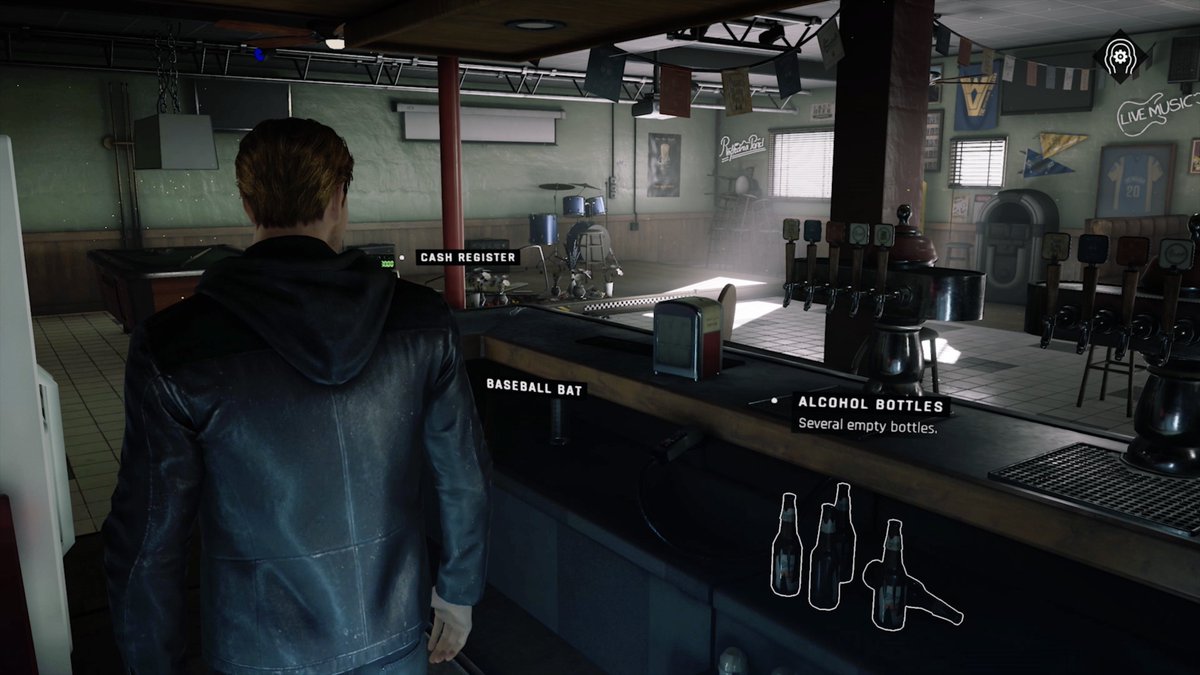
There’s a real balance that has to be struck for mystery and puzzle games. Make the solution easy enough to not be discouraging but hard enough that it is testing the player. Unfortunately, in Twin Mirror, the mysteries were painfully easy. The “hardest” mystery has 3 questions with 3 answers apiece. Chewing through 27 combinations isn’t super hard to brute force. But of course, that implies that you aren’t paying attention, that you can’t see the contradictory evidence or that you learn nothing from the incorrect choices. Whilst it isn’t an absolutely pointless mechanic, it’s concerning that a game ostensibly about mystery-solving feels light on the mystery. The Mind Palace acts as a convenient storage space for all the flashbacks, and the game utilises it at most around 5 times. It doesn’t exactly feel as much of a central mechanic in practice.
The game also has a habit of opening plot holes. After forgetting details of a crime because of being drunk, Sam, upon piecing it together, recalls the event in impossible detail. Enough detail however to conveniently move the plot along.
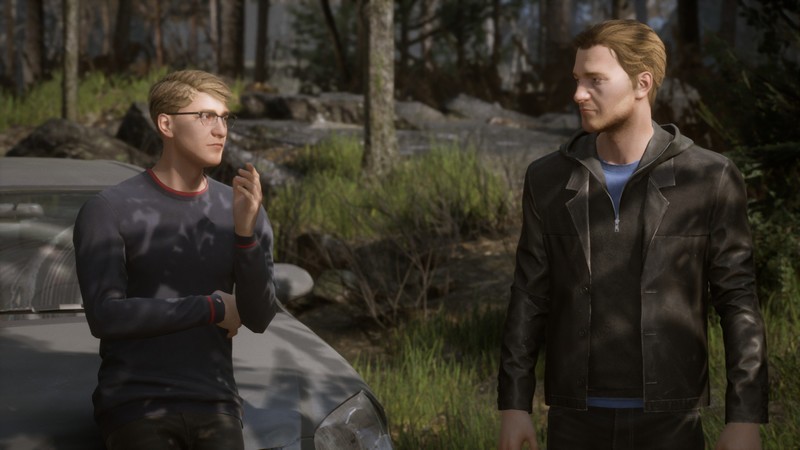
The Twin: Discussion Choices and Sam’s Double
The other half of Twin Mirror is, well, Sam’s other half. A mysterious character who goes unnamed in the game and is referred to simply as “him”. For ease of discussion, I’ll instead refer to “him” as “The Double”, a name that only really shows up in synopsis. The Double acts as the sociable, outgoing, kind yang, to Sam’s distant, reclusive, harsh yin. I was a bit confused by this character at first. There is very little conversation about this character. For essentially two-thirds of the game, he’s acknowledged but unexplored.
Here’s the thing, The Double as a mysterious figure doesn’t work for me. I understand the intent. The Double represents some hidden part of Sam’s psyche that wants to learn to love again or something of similar cheese factor. The unknowable qualities make his intents unknown. We’re not supposed to focus on the character. He, amusingly enough, acts as shall we say a “Twin Mirror”. Another version of Sam that reflects his flaws back at himself. One could even say the lack of information about him leaves the questions open. Is Sam hallucinating? Maybe The Double is a ghost haunting him? Or a guardian angel? The problem is the lack of information is a bit overwhelming. For the longest time, Sam doesn’t even refer to any element.
“The Double acts as the sociable, outgoing, kind yang, to Sam’s distant, reclusive, harsh yin.”
The other problem with the presence of The Double is it feels too much like the devs are having their cake and eating it too. Sam is a super-duper, no-holds-barred, gruff Batman-like figure, minus the parental murder and fighting capabilities. But how could players feel the ability to influence him to be better? Well just outsource it to a new character. A new character that, mind you, is invisible and often presented in conversations where the time is paused.
In fact, the Double in a sense provides Sam’s motivation to be a better person. This is where the more familiar side of DONTNOD comes into play. The Double is a motivator in Sam reaching out to people. As such he is the main instigator of the big player choices. He’ll pop in and say “hey don’t do that, here’s why…”. Sam will of course rebut and assert why his way is better. Finally, the options labelled as Sam or The Double are presented. It’s these verbal spars that provide the biggest choices in the games. Of course, this also extends through all manner of conversations and moment to moment decisions. It’s pulled off fairly well, especially when it’s not exactly clear on what these choices are amounting to.
The Double does shine a bit in the plot. Eventually, there is a discussion of the history between Sam and his invisible twin. Mind you, it’s very far into the plot, much further than I’d like. However, the context is appreciated. There is a conversation about how the double came to be. Also, there is a pretty good choice made in the psychological climax of this game. It’s a choice that really contextualises a lot of Sam’s character.
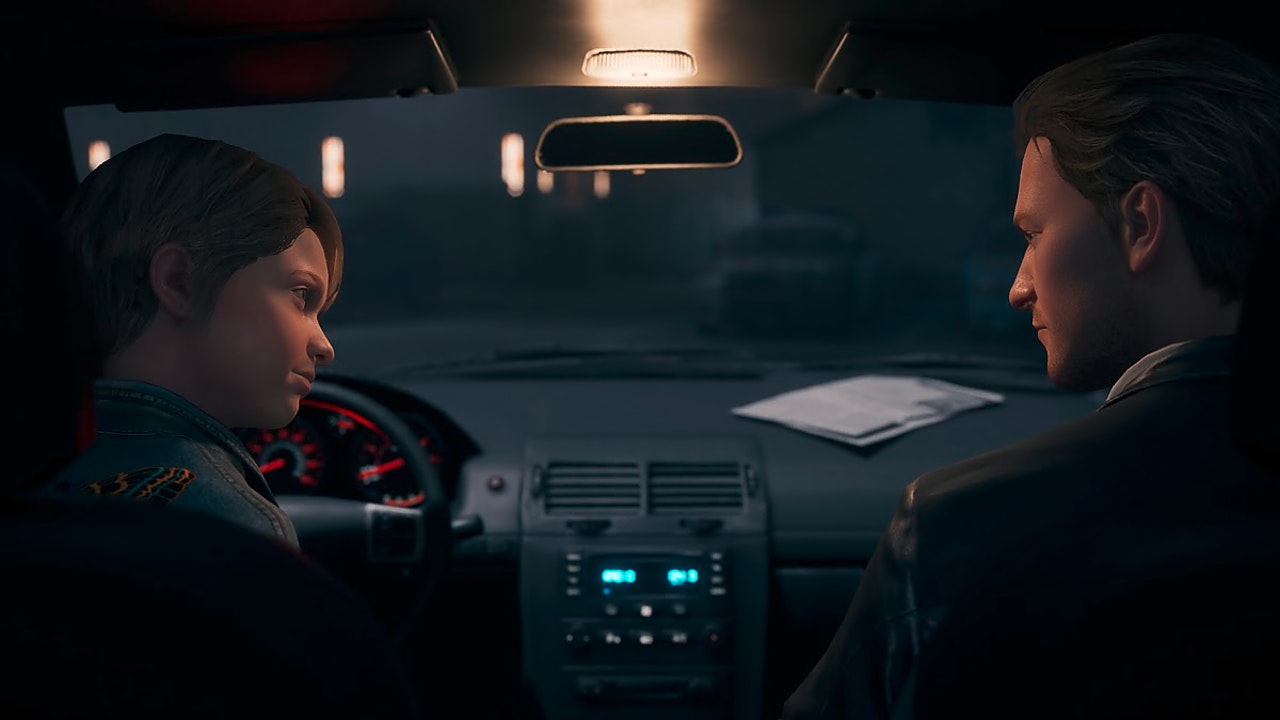
Throughout the game, The Double starts off as a blurry figure, a partial reflection in a rearview mirror. The emotional climax of the game puts the two characters on equal footing. The problem lies in the fact that it is a detour in the plot. The main characters are en route to the big boss fight when you’re wrenched sideways into this discussion. In all fairness, this big discussion and subsequent decisions do inform the big finale in interesting ways. It also adds some context to the story as a whole and reframes elements. But it’s hard to not judge the writing on the inelegant way it carries itself at times.
The culmination of these magical realism elements is one I’m a little ambivalent on. I like how these largely unexplored, highly metaphorical elements take on big meanings. How it evolves from “a cool brain aesthetic” and “an annoying sidekick” into manifestations of Sam’s psyche. Granted, the seeds were there but cloaked in a miasmic haze of “indie psych artsy vibes”. The climax makes these elements concrete. Having said that, I’m not entirely on board with the divergent paths leading to the ending. Perhaps this is just me pontificating, but it feels a bit unsatisfying in certain ways. Sam’s character feels like he comes in with one mindset, that work and happiness are incompatible, and the ending kind of just confirms it? Sure, you can sway the needle into the good version of this mindset, but the joy of the ending is still a bit undercut.
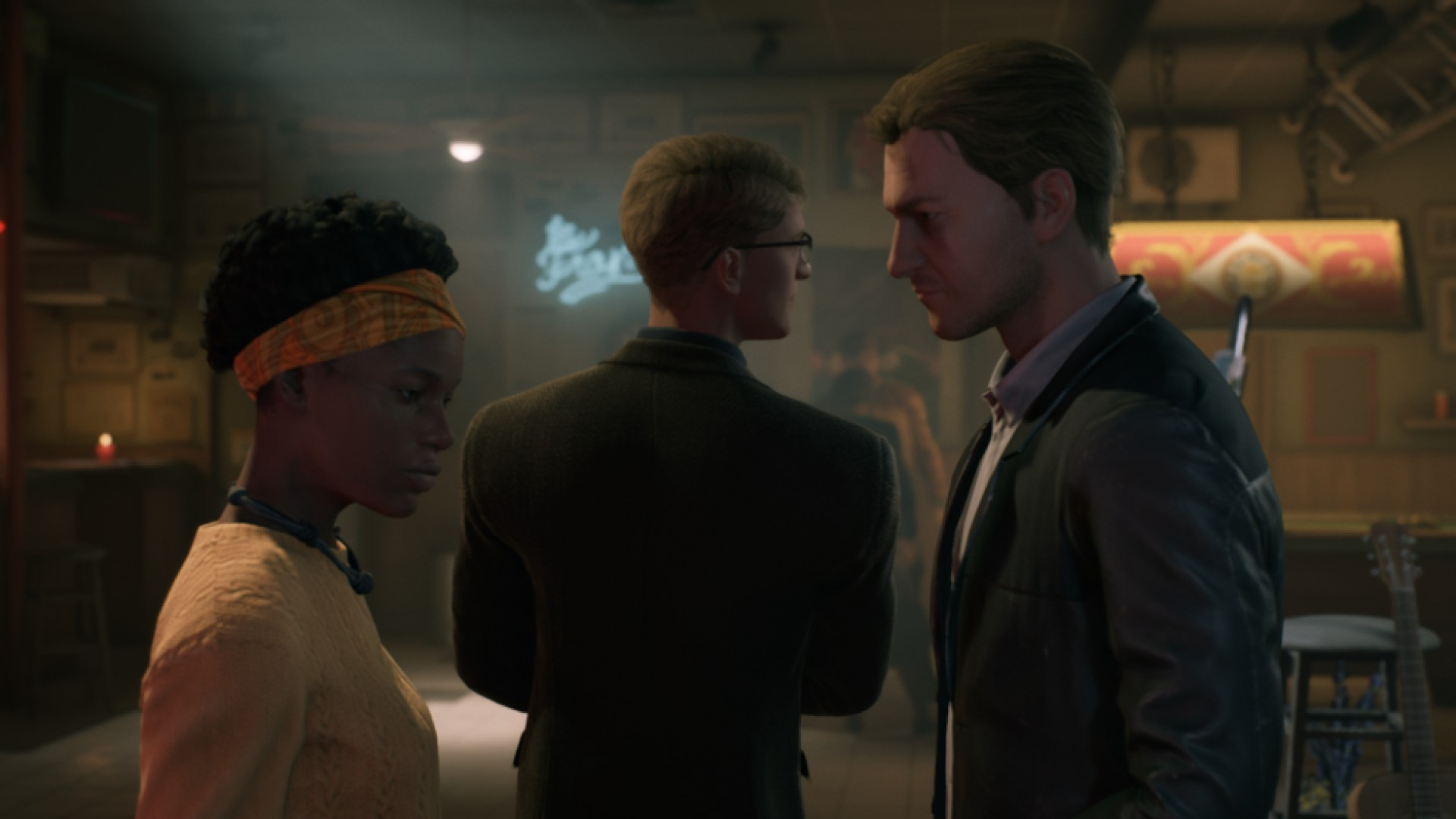
Deuteragonists: Why Twin Mirror isn’t up to scratch
The magical realism, as much as you may like or dislike it, can’t distract from how flat the story is. It’s one of those mysteries that, while I can’t point to a specific film, I imagine this exact story has shown up a few times. As part of professional curiosity, partway through the game, I drew up a bingo card. Wouldn’t you know it, by game’s end I’d filled in half the boxes. This is coming from someone that often is pretty bad at predicting this kind of thing. Also, at this risk of inflating my ego, I think more of the card would have been filled in had I known how short this game was. Perhaps it’s an unfair comparison, but the 5-episode long seasons that make up most of DONTNOD’s more prominent catalogue left me with an expectation hovering around 10 hours for Twin Mirror. I’ve played through the game twice with about an 8 hour total. It’s a bit paltry, to say the least.
“As part of professional curiosity, partway through the game, I drew up a bingo card. Wouldn’t you know it, by game’s end I’d filled in half the boxes.”
I think for me the real issue lies with the protagonist. Sam is a bit too much of a stereotypical character. He’s moral, upstanding, but bitter about his treatment from others. He fits into this frustratingly bland, perfect model, albeit with warped social skills. Of course, there is the asterisk that should the player want to he can develop into a typical, well-rounded, socially adept individual. My first playthrough, in which I moulded Sam into a callous, deplorable halfwit, was amusing. My second playthrough made Sam into a bit of a cheesy but nice enough guy. Suffice to say I prefer the arc of the latter.
“But wait!” you say, “You like Life is Strange, and their protagonists are pretty similar”. That is actually true, and it made me realise the tiniest error that undermines Twin Mirror. See all the Life is Strange and spinoff adventures have one thing in common. All the games have two clear main characters. There is the protagonist, that we control, and there is the deuteragonist, the main NPC if you will. Life is Strange focuses on our protagonist Max, helping old friend/love interest Chloe search for her friend. The sequel focusses on Sean going on the run from the law with his younger brother Daniel. The key in these cases is the deuteragonist helps round out the character, it gives motivation, it helps dissolve some of the neuroticism of a singular internal monologue. We worry about the safety of another character, and the additional complications of another person, with which we don’t have control.
Funnily enough, though, Twin Mirror isn’t missing a deuteragonist. In fact, the issue is it tries to have two, and neither fully fill the role.
The first is the aforementioned Double. He doesn’t quite stack up for a host of reasons. He’s a reflection. He has personality but there’s no way of understanding him as a separate entity. Short of an at-home lobotomy, he can’t be placed in any danger. There’s no complex backstory. Hell, you have to wait multiple hours before we’re told the nature of the companion. But given that this seems like a relationship with his own psyche, it’s hard to call the relationship one capable of carrying the narrative.
“…if you don’t like Sam, the relationships really aren’t going to distract from his faults..”
The second candidate is Anna. She acts as a freelance journalist, as well as a contrasting character. She’s curious, and truth-seeking like Sam, but she is very personable, kind and caring. In fact, oddly enough there are very clear parallels between both the Double and Anna, as encouragement for Sam to be social. Now Anna does have a lot more going under the hood. She has a tragedy that she gets upset about. Sam has to carefully broach sensitive topics when talking to her. She as an actual, visible, tangible person has to worry about physical danger. She does seem like a prime candidate. Having said that, she gets much less screen time than the Double. In fact, big moments of realisation about Sam’s relationship with Anna are delivered by the Double. So while Anna might be a bit closer to the ideal secondary character, she still manages to fall short.
So what happens if there are too many deuteragonists? We only see these two characters through Sam’s eyes. So both of these relationships point inward back to Sam. In short, if you don’t like Sam, the relationships really aren’t going to distract from his faults.
6
Decent
Positive:
- Visually and sonically interesting
- Magical realism eventually resolves into an interesting conclusion
- Choices do have a good pay off, considering the length
Negative:
- Sam is a mostly bitter, uninteresting protagonist, and entirely the centre of the story
- The plot is super predictable
- The mystery gameplay lacks any meaty challenge
Whilst not a true tragedy, Twin Mirror didn’t live up to expectations in my book. The visual and auditory style of DONTNOD is fantastic, and the way it ties into the gameplay is nice. However, it doesn’t stack up to its peers both inside and outside the developer’s library. The magical realism is a bit confusing and lacking in context and the eleventh hour save doesn’t pull it above criticism. A mystery existed but there just wasn’t enough meat on that bone. I can see this game aging well for me, as I remember only the nice parts and filter out the bad stuff. But as it stands, as I write this review, there is just too much of a gap between me and unqualified praise to be able to give it a proper stamp of approval.





